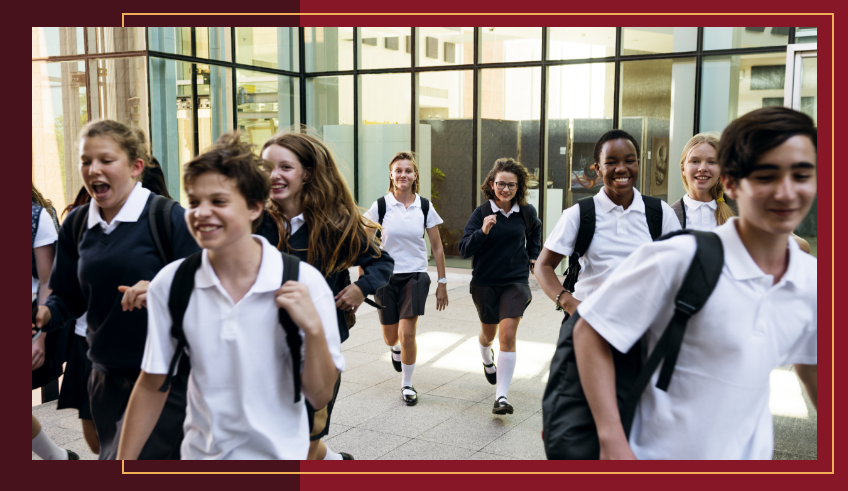Boarding schools have long been subject to curiosity, which can often lead to myths and rumours. Today, we want to unveil the truth about boarding schools, dispel misconceptions, and acknowledge and embrace the positives. We want to provide a comprehensive exploration that aims to debunk many common myths that many still believe. Hopefully, we can shed some light on the transformative, enriching, and positive environments they provide to students worldwide. It is essential not to allow these misconceptions to hold your child back from the exceptional education experience they will likely find at a boarding school.
Misconception number one: Boarding schools are strict and rigid
Discipline is a major part of any educational institution, but that does not mean they are overly strict and rigid. Modern boarding schools have evolved tremendously, fostering a supportive environment that nurtures the well-being of students and faculty alike. At boarding school, students usually experience a sense of camaraderie with peers and form trusting bonds with teachers and staff who serve as their mentors, providing support, guidance, and a friendly face throughout their educational journey.
Misconception number two: Boarding Schools lack diversity
Contrary to this belief, most boarding schools prioritise diversity and inclusivity. At a modern boarding school, you are more likely to find students from various cultural, socio-economic, and geographical backgrounds than you are likely to find in a regular school. Creating a vibrant and enriching community is part of the ethos, exposing students to diverse perspectives and enhancing their global awareness. This is a fantastic way to prepare students for the world beyond school.
Misconception number three: Boarding schools are for troubled students
Though certain schools may cater to students facing behavioural challenges, boarding schools are not usually the place. These institutions are often chosen by families because of their focus on academic excellence, extracurricular activities, and strong character development. Boarding schools provide environments focusing on academic and personal growth to create responsible and well-rounded individuals.
Misconception number four: Students in a boarding environment often lack independence
This couldn’t be further from the truth; boarding school actively promotes self-reliance and independence. When students live away from home, they are encouraged to take much more responsibility in their daily routines, manage time efficiently, and learn to make important decisions about their studies, free time, and additional activities. This set of skills that students acquire when studying at a boarding school is invaluable as they transition from school into university and their professional lives.
Misconception number five: Boarding schools encourage an overly competitive environment
While academic excellence is a major priority at boarding schools, they strive to foster a supporting environment with a significant focus on collaborative learning. There is certainly no cutthroat competitive atmosphere but a dedication to personal growth. Due to the live-in nature of a boarding school, there is usually a lot of emphasis on the importance of teamwork, leadership, togetherness, and resilience, preparing them to accept both success and failure to help support them in all aspects of their lives.
Misconception number six: Teachers at boarding schools can be unfriendly
There has been an ongoing assumption that boarding school environments can be harsh, but that isn’t true. Boarding school teachers are highly trained and dedicated professionals who actively engage on both personal and academic levels to promote a positive student environment. Boarding school’s primary focus is to create a community where everybody thrives, so the teachers are usually extremely friendly.
Misconception number seven: There isn’t any fun to be had at boarding schools
Boarding schools focus heavily on providing a balanced and comprehensive approach to education, ensuring that students have access to multiple extracurricular activities and keep in high spirits throughout their stay. They are far from being dull or lacking in fun and have a perpetual focus on creating an enriching environment for everyone involved.
Misconception number eight: Boarding school environments can be isolating and lonely for students
By no means will a student at boarding school ever feel isolated and lonely. Of course, they might miss home at the beginning, but it doesn’t take long to feel like part of a community. Boarding schools are strong communities that foster a sense of belonging among students. Everyone who attends will share wonderful experiences and develop lifelong friendships. The staff at boarding school go to great lengths to ensure the student environment is inclusive and welcoming and everyone feels connected and supported throughout their educational journey.
Misconception number nine: Students at boarding schools lose touch with their families
While it is true that students will live away from home when attending a boarding school, it does not mean communication with their families is lost. In fact, boarding schools ensure that families are also part of the community and encourage everyone to get involved with extracurricular activities and school events. They also ensure that students maintain consistent communication, allowing them to stay connected with their families.
Taking a look at the positives of a boarding school environment
Instead of focusing primarily on the myths about boarding schools, it is also essential to look at the positive aspects students and parents are likely to experience in a boarding environment. Boarding schools are private institutions with the funding, staff, and ability to create the best possible environments and outcomes for all children attending.
Promoting holistic education – Boarding schools prioritise holistic education, providing a perfectly balanced mixture of academics, arts, sports, and extracurricular activities. This approach encourages students to develop a diverse skill set and a passion for lifelong learning.
Developing a sense of community – Living on campus is one of the best ways for students to create a true sense of belonging. They are constantly surrounded by support, whether from staff or peers. All aspects of living at a boarding school heavily contribute to a positive and nurturing environment.
Multiple diverse extracurricular opportunities – At many boarding schools, students are likely to find a plethora of extracurricular activities to enjoy outside of learning. Thanks to the funding they receive, they are able to invest in the best facilities to offer a wide range for all students to enjoy. This promotes personal growth in many ways and allows children to explore numerous possibilities as they start to learn what they love.
Real preparation for independence – Boarding schools like to promote an environment where students get to make decisions for themselves and develop an understanding of how to prioritise their free time. This significantly enhances their transition to university and beyond, allowing them to approach situations with knowledge, certainty, and consideration.
The highest standard of teaching and mentoring – Boarding schools often boast incredibly experienced and highly qualified faculty who go far beyond the responsibilities of merely educating their students but also act as mentors to students throughout their entire school life. The close interactions between teachers and students allow them to personalise guidance and pay close attention to every student’s specific needs, nurturing both academic and personal development.
Gaining global perspectives – At boarding schools, students are exposed to a diverse student body that brings multifaceted global perspectives to their learning environment. Boarding school graduates are renowned for having a much broader worldview and cultural understanding. This alone is a fantastic tool that helps them navigate an interconnected global society, giving them more opportunities than they are likely to have otherwise.
Building resilience – Living away from home, adapting to communal living, and facing the challenges of school builds magnificent resilience in students. Boarding school experiences massively contribute to their adaptability, giving them the skills to overcome any obstacles they may face throughout their lives.
Find out more about how a boarding school can provide the best possible start to life
We hope to have dispelled some common myths that people often believe about boarding environments. Boarding schools are vibrant communities prioritising academic excellence, personal growth, fun, and engagement. If you want to learn more about what boarding schools can provide for your children, contact Bromsgrove International School Thailand today. We are proud to be one of the leading educational institutes in Southeast Asia, providing a robust curriculum to ensure students have the best possible start to life. Students at Bromsgrove have been achieving academic excellence for over twenty years and will be for many more to come. If you have any questions regarding our facilities, teachers, boarding, curriculum, or anything else, our highly trained faculty will be pleased to answer any of your questions. We can’t wait to help your child reach new heights of achievement.





























